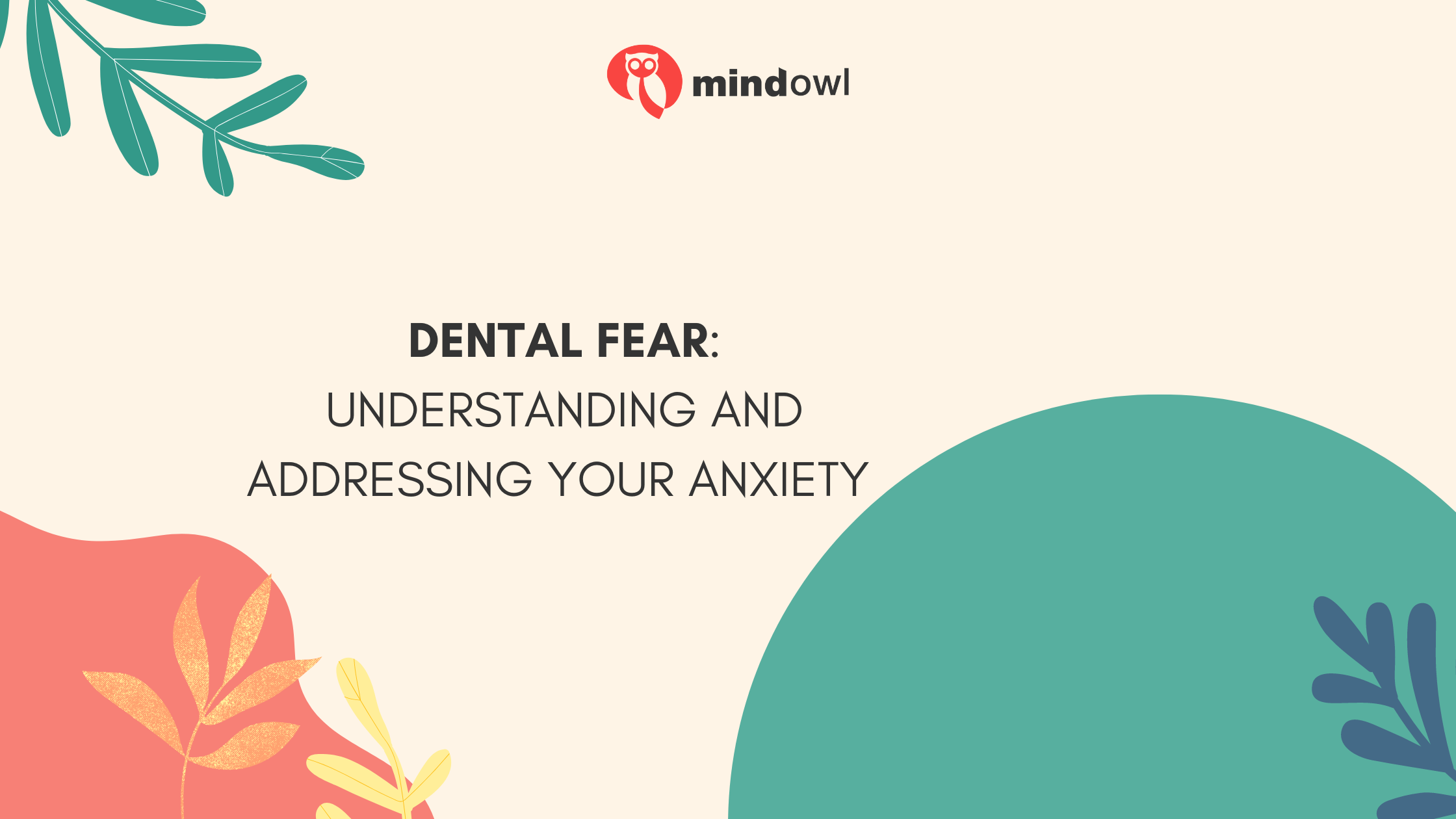Dental anxiety affects people of all ages, particularly children, adults with past negative experiences, those with general anxiety or phobias, individuals with a history of trauma, the elderly, patients needing extensive dental work, and those with sensitive gag reflexes.
Children fear the unknown, while adults often fear pain and loss of control. Those with anxiety disorders or trauma histories are more susceptible. Elderly patients may recall outdated, painful procedures. Frequent treatments and financial concerns can worsen anxiety.
In this article, you’ll learn more about the root of dental fear and effective ways to manage and alleviate it effectively.

What Is Dental Fear?
Dental fear, also known as dental anxiety or dental phobia, is a common condition characterized by a feeling of apprehension or fear about visiting the dentist. This fear can range from mild anxiety to severe phobia, and it can have a significant impact on an individual’s willingness to seek dental care. A local Winnipeg dentist or a dental professional in your area can help with strategies to manage and overcome dental fear.
Symptoms of Dental Fear
The common manifestations of dental anxeity include the following:
- Sweating
- Racing heartbeat (tachycardia)
- Low blood pressure and possible fainting (vasovagal response)
- Visible distress, crying, or signs of panic
- Withdrawal and avoidance of dental care
Children may go to great lengths to avoid dental appointments, displaying behaviors such as refusing to leave the house, hiding, or making excuses to skip dental visits.
For elderly patients, particularly those with cognitive impairments or dementia, dental fear can exacerbate confusion and distress, making it even more challenging to manage their anxiety during dental visits.
Causes of Dental Fear
Understanding the causes of dental fear enables dental professionals to provide tailored interventions, improving patient comfort and communication. This knowledge helps dentists create a more reassuring environment, address specific anxieties, and offer appropriate sedation or distraction techniques. It also prevents avoidance behavior, encouraging regular dental visits and better oral health.
Here are the casues of dental anxiety:
1. Previous Negative Experiences
These experiences can lead to significant fear and anxiety about future visits. Painful procedures, complications, rough or insensitive dentists, unpleasant office environments, and feelings of embarrassment or judgment all contribute to this fear. This can create a cycle of avoidance, where fear leads to neglect of dental care, resulting in more severe issues and the need for more extensive treatments in the future.
2. Pain
This fear can arise from past painful experiences, anticipation of discomfort, a low pain threshold, hearing about others’ painful encounters, and concerns about inadequate pain management. These factors can lead to avoidance of dental care, resulting in more severe dental issues that require more invasive and painful treatments, thereby perpetuating the cycle of anxiety and neglect.
3. Loss of Control
The feeling of loss of control during dental visits can heighten anxiety. Factors such as lying in a vulnerable position, not being able to see what the dentist is doing, lack of communication, restricted movement, and sensory overload contribute to this fear. These elements create a sense of powerlessness, leading to increased apprehension about dental visits and a higher likelihood of avoiding necessary dental care, exacerbating dental health issues.
4. Embarrassment
Embarrassment about dental health can cause significant anxiety. Factors include self-consciousness about teeth appearance, concerns about bad breath, fear of judgment from the dentist, societal stigma, and past negative reactions from dental professionals. These feelings can make individuals reluctant to show their mouths, fearing criticism. As a result, they may avoid dental care, leading to worsening dental issues and reinforcing the cycle of anxiety and neglect.
5. Vicarious Learning
Hearing about negative experiences from family, friends, or media makes some people internalize the fear of painful or traumatic dental procedures. Vivid descriptions and repeated exposure to such stories can amplify anxiety, leading to avoidance of dental visits. This avoidance reinforces the fear, resulting in poorer oral health and a cycle of anxiety and neglect.
6. Generalized Anxiety
Individuals with Generalized Anxiety Disorder (GAD) often have heightened fear responses to dental visits due to their tendency to worry excessively. This leads to amplified stress about potential pain, negative outcomes, and costs, causing physical symptoms like increased heart rate and sweating. The intense anxiety can result in avoidance of dental care, worsening oral health. Understanding and addressing GAD in dental patients is crucial for providing compassionate, effective care and reducing their anxiety.
7. Fear of Needles
Many dental procedures involve injections for anesthesia, which can trigger significant anxiety in individuals who have trypanophobia. This fear of needles can deter people from seeking necessary dental care.
8. Sensory Sensitivities
People with heightened sensory sensitivities, such as those with autism spectrum disorder (ASD) or sensory processing disorder (SPD), may find the sounds, smells, and sensations of a dental office overwhelming and distressing, leading to anxiety.
9. Financial Concerns
Worries about the cost of dental treatments can contribute to anxiety. The fear of receiving a large bill or being unable to afford necessary care can cause people to avoid dental visits altogether.
10. Cultural Beliefs
Cultural beliefs and stigmas surrounding dental health and professional care can influence individuals’ attitudes and fears about dental visits. In some cultures, there might be a distrust of medical professionals or a stigma associated with seeking dental care, leading to increased anxiety and avoidance.
Impact of Dental Fear
Here are the impacts of dental anxiety:
- Oral Health: Avoiding dental visits can lead to poor oral health, untreated dental problems, and more complex and painful issues over time.
- General Health: Poor oral health is linked to various systemic conditions such as heart disease and diabetes.
- Quality of Life: Dental fear can affect an individual’s self-esteem and quality of life, especially if it leads to visible dental problems.
- Financial Burden: Delayed dental care often results in the need for more extensive and expensive treatments later on, increasing the financial burden on individuals.
- Social Anxiety: Visible dental issues caused by neglect can lead to embarrassment and social anxiety, making individuals reluctant to engage in social interactions.
- Nutritional Impact: Severe dental problems can affect chewing and eating habits, leading to nutritional deficiencies and impacting overall health and well-being.

Managing Dental Fear
Managing dental fear is essential for maintaining good oral health and preventing severe dental issues. It ensures regular dental visits, which can prevent and treat problems early, reducing the risk of systemic conditions like heart disease and diabetes.
Overcoming dental anxiety also improves quality of life by enhancing self-esteem, social interactions, and overall well-being, while preventing costly emergency treatments and promoting healthy eating habits. Here are effective ways to manage dental fear:
- Communication: Open and honest communication with the dentist about fears and concerns.
- Relaxation Techniques: Deep breathing, meditation, and other relaxation techniques can help reduce anxiety.
- Sedation Dentistry: For severe cases, options like nitrous oxide, oral sedatives, or intravenous sedation may be used.
- Gradual Exposure: Slowly exposing oneself to the dental environment and procedures to build comfort and reduce fear over time.
- Professional Support: Seeking help from psychologists or counselors specializing in phobias and anxiety.
- Distraction Techniques: Listening to music, podcasts, or watching videos during dental procedures to divert attention and reduce anxiety.
- Cognitive Behavioral Therapy (CBT): Working with a therapist to change negative thought patterns and behaviors related to dental visits.
- Visualization and Guided Imagery: Using mental imagery to visualize calming and positive scenarios during dental appointments.
- Positive Reinforcement: Rewarding oneself after successful dental visits to create positive associations and motivation for future visits.
- Hypnotherapy: Utilizing hypnosis to achieve a deeply relaxed state and reduce dental fear and anxiety.
How to Choose A Dentist for Dental Anxiety
Choosing a local dentist who understands dental fear is essential for a comfortable experience. Start by asking friends and family for recommendations and checking online reviews on platforms.
Look for dentists who are members of professional associations indicating their commitment to high standards and continuing education. Schedule an initial consultation to discuss your concerns and evaluate the dentist’s communication skills, as good communication is crucial for managing anxiety.
Inquire about the sedation options the dentist offers, such as nitrous oxide, oral sedation, or IV sedation, and ensure they understand your specific level of anxiety. Visit the dental office to see if it feels welcoming and comfortable, and interact with the staff to gauge their friendliness and understanding.
A calming environment and supportive staff can significantly reduce anxiety. Additionally, check the dentist’s experience with anxious patients and any special training they might have in managing dental fear.
Look for a dentist who is willing to create a personalized treatment plan tailored to your needs and offers flexible scheduling options to accommodate your preferences. Ensure they provide aftercare support and regular follow-up appointments to build trust and reduce anxiety over time. Taking these steps will help you find a dentist who can provide a positive and reassuring dental experience.
Conclusion
Recognizing the root causes allows for a holistic approach, integrating care with mental health professionals if necessary. By addressing both emotional and physical aspects of dental fear, dentists can foster trust, reduce anxiety, and ensure comprehensive care, leading to improved patient outcomes and a positive dental experience. Dentists are trained to work with anxious patients and can offer various strategies to help manage and overcome this fear.
MindOwl Founder – My own struggles in life have led me to this path of understanding the human condition. I graduated with a bachelor’s degree in philosophy before completing a master’s degree in psychology at Regent’s University London. I then completed a postgraduate diploma in philosophical counselling before being trained in ACT (Acceptance and commitment therapy).
I’ve spent the last eight years studying the encounter of meditative practices with modern psychology.

